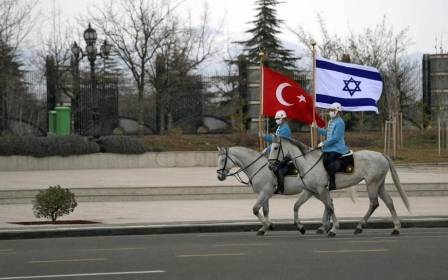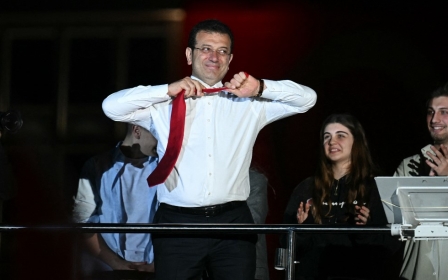Turkey: Secularist opposition leader is against removal of Arabic signs in cities

The leader of Turkey's traditionally secularist main opposition, the Republican People's Party (CHP), said on Sunday that local municipalities under his party's control should not target Arabic banners and signs.
Ozgur Ozel said that focusing solely on Arabic banners would be insensitive to the devout Muslims in the country.
"In a closed-door meeting, I advised my colleagues that targeting only Arabic could spark controversy regarding other foreign languages," he explained in televised remarks.
"Arabic is the language of the holy Quran, and singling it out could unintentionally hurt our citizens."
In recent years, Turkish politicians from both the right and the left have adopted an anti-refugee stance amid an economic crisis characterised by the rapid depreciation of the Turkish lira and negative interest rates, leading to an inflationary spiral.
Stay informed with MEE's newsletters
Sign up to get the latest alerts, insights and analysis, starting with Turkey Unpacked
Turkey currently hosts nearly four million refugees, predominantly Syrians, but also Afghans, Iranians, and others.
The CHP became the largest voting block in the March local elections, winning control of dozens of cities nationwide, including in the five largest, such as Istanbul and Ankara.
Ozel was elected as the chairman of the party last year after the CHP candidate suffered a defeat in the presidential race. Since then, he has extended a hand to Turkish President Recep Tayyip Erdogan, visiting him at his office earlier this month and signalling a more dialogue-oriented policy.
Following the victory, CHP mayors in cities like Bursa, Kilis, Izmir, Afyon, and Usak began removing Arabic banners and signs from stores.
Ozel emphasized that there are existing regulations on how to handle this issue, distancing himself from the actions taken by some party officials.
"No one should remove these banners if they serve people in their native language for specific reasons," he said. "We should understand what they mean before taking them down."
Disrespectful
Ozel, in a separate statement on Monday, highlighted that there are six million Turkish citizens whose native language is Arabic.
"Disrespect for Arabic is perceived as disrespect for those people," he said at the CHP headquarters after a meeting. "I forbid everyone from using the word 'Arab' as an insult. We have millions of Arab neighbours around us."
Additionally, some municipalities have started to impose excessively high fees for marriages between foreign nationals, including Syrians.
The mayor of Afyonkarahisar, Burcu Koksal, said the fee for civil marriage ceremonies would increase from 400 lira ($12.4) to 10,000 lira ($310) for refugees.
Ozel said that local mayors would not be able to resolve the refugee crisis with such tactics.
"You cannot send Syrians back to their homeland simply by refusing to conduct marriage ceremonies," he added.
Middle East Eye delivers independent and unrivalled coverage and analysis of the Middle East, North Africa and beyond. To learn more about republishing this content and the associated fees, please fill out this form. More about MEE can be found here.




